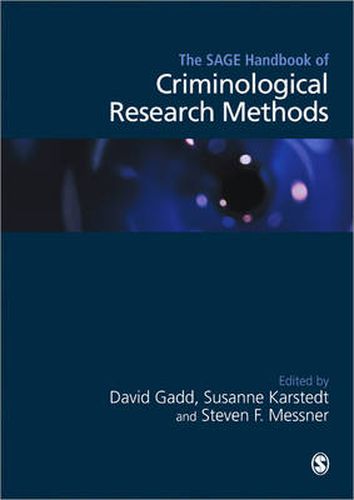Readings Newsletter
Become a Readings Member to make your shopping experience even easier.
Sign in or sign up for free!
You’re not far away from qualifying for FREE standard shipping within Australia
You’ve qualified for FREE standard shipping within Australia
The cart is loading…






Conducting research into crime and criminal justice carries its own unique challenges. This Handbook focuses on the application of methods, broadly understood, to address the core substantive questions that currently motivate contemporary criminological research. It maps a canon of methods that are more elaborated than in most other fields of social science, and the intellectual terrain of research problems with which criminologists are routinely confronted. Chapters in each section will illustrate not only the techniques (qualitative and quantitative) that are commonly applied in empirical studies, but also the logic of enquiry - the ways in which the specific nature of research questions dictate the kinds of data and analytic strategies required to effectively answer these questions. Organized into five sections, each of which is prefaced by an editorial introduction, the Handbook covers: o Crime and Criminals o Crime’s Contexts: Networks, Cultures and Communities o Perceptual Dimensions of Crime o Criminal Justice Systems: Organizations and Institutions o Preventing Crime and Improving Justice Edited by leaders in the field of criminological research, and containing contributions by internationally renowned experts, The SAGE Handbook of Criminological Research Methods is comprehensive, forward-thinking and broad in its enquiry. Written for post-graduates, researchers and academics in criminology, criminal justice, policing, law, and sociology, this exciting, much-needed addition to the criminological library is set to become a definitive resource for research.
$9.00 standard shipping within Australia
FREE standard shipping within Australia for orders over $100.00
Express & International shipping calculated at checkout
Conducting research into crime and criminal justice carries its own unique challenges. This Handbook focuses on the application of methods, broadly understood, to address the core substantive questions that currently motivate contemporary criminological research. It maps a canon of methods that are more elaborated than in most other fields of social science, and the intellectual terrain of research problems with which criminologists are routinely confronted. Chapters in each section will illustrate not only the techniques (qualitative and quantitative) that are commonly applied in empirical studies, but also the logic of enquiry - the ways in which the specific nature of research questions dictate the kinds of data and analytic strategies required to effectively answer these questions. Organized into five sections, each of which is prefaced by an editorial introduction, the Handbook covers: o Crime and Criminals o Crime’s Contexts: Networks, Cultures and Communities o Perceptual Dimensions of Crime o Criminal Justice Systems: Organizations and Institutions o Preventing Crime and Improving Justice Edited by leaders in the field of criminological research, and containing contributions by internationally renowned experts, The SAGE Handbook of Criminological Research Methods is comprehensive, forward-thinking and broad in its enquiry. Written for post-graduates, researchers and academics in criminology, criminal justice, policing, law, and sociology, this exciting, much-needed addition to the criminological library is set to become a definitive resource for research.